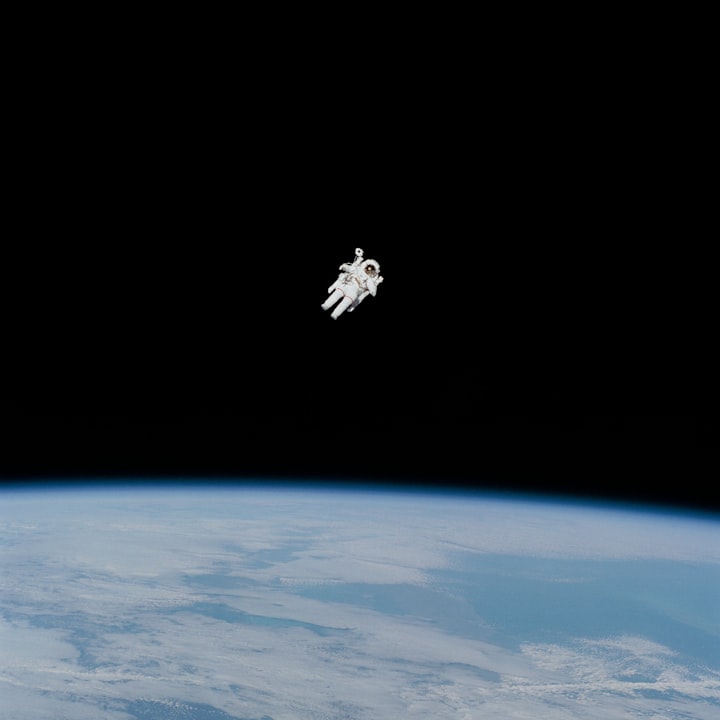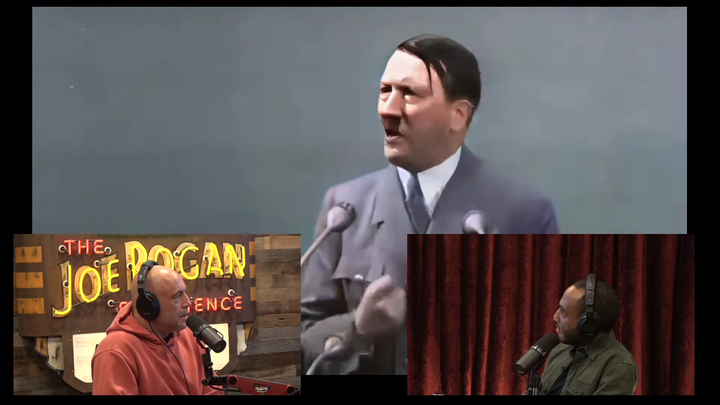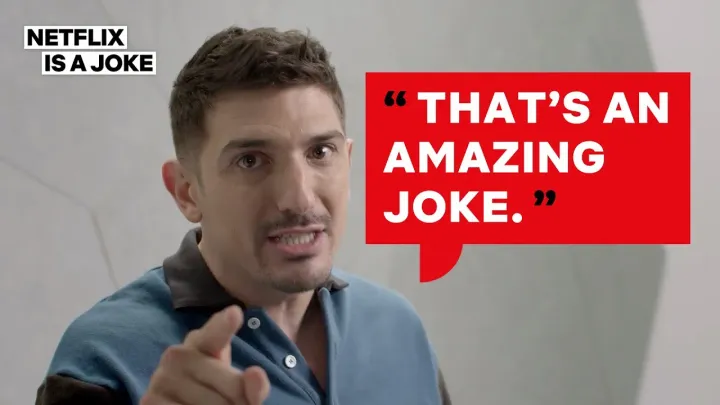These People All Know What They Are
A look at speech in action.

Content warning: this newsletter quotes racist, transphobic, and antisemitic jokes.
I have argued now and again over the years that right-wing comedy provides a safe space for bigotry, giving racists and misogynists and transphobes and their ilk permission to be racist and misogynist and transphobic, at times even celebrating these qualities in a world that persecutes anyone who dares to think differently. Here, it’s all good, there are plenty of us, it’s everyone else who’s wrong. I have argued in a similar vein that right-wing comedy helps to reify conservative social norms, for instance structural racism and sexism and transphobia. Today I would like to share two recent examples of these effects in action. In one, the comedian Luis Gomez discusses his fans’ tendency to be racist around him, which annoys him because he’s not actually racist in real life. In the other, Andrew Schulz and his podcast co-hosts argue that pop cultural objects should make a point of acknowledging when their characters are “different,” lest they take viewers out of the experience. Be warned: some of the most mind-numbingly terrible takes you’ve ever heard lie ahead.
Let’s start with Gomez, cohost of the podcast Legion of Skanks. In a recent episode of Perfect Guy Life, hosted by the white supremacist comedians Sam Hyde and Nick Rochefort, he complains that his fans occasionally mistake him for a racist:
GOMEZ: Once in a while I'll be on the road and some guy will come up to me, and he's like a real racist, and he'll just try to relate to me with real racism. And I'm like, dude, I'm brown. What are you doing? Like, I get that we play racist on the internet—
ROCHEFORT: If you're really racist, you should be tying my ankles together and dragging me from a truck.
GOMEZ: You're the worst racist ever. You paid to see me perform.
Mere seconds later, he explains how much he likes racist comedy:
GOMEZ: I think racism's genuinely funny. Like, legitimately, just as a category of comedy. I think racist comedy is fucking hilarious. I grew up on it. We just grew up telling racist jokes.
ROCHEFORT: Nonstop.
GOMEZ: It was the best.
ROCHEFORT: It was the best of times.
GOMEZ: What was your favorite street joke as a kid? Your favorite racist street joke?
ROCHEFORT: If there were three apples on the table and Jamal took one, what color was Jamal?
GOMEZ: [Through laughter] There’s no punchline. That's just the joke.
ROCHEFORT: Like, I always love that diversionary, like—two apples or one? How about you guys? What's your favorite street racist joke?
GOMEZ: Why do Indian girls have that red dot on their forehead? Because people keep on going up to them being like, [pantomining poking someone in the face] "You are so fucking ugly."
ROCHEFORT: What's Sam's favorite?
HYDE: I'm trying to think if I even remember anything like that.
ROCHEFORT: It's like the spray paint the nostrils joke. Remember that one? Like, why do Blacks have big nostrils? 'Cause when God spray painted 'em, he held 'em up by the nostrils. That joke. I like when this—I was with Adam Friedland one night and we were just doing all the drugs in the world. And it was just me and—there was two Black dudes there, and we were sitting there and I'm like, I don't wanna sit here and pretend like my dad wasn't fucking screaming [censored word that ends in “—er,” what could it be] from the mountaintops my entire childhood. Like, you want me to lie to you as a friend, as a liar? Every—there were always, always, nonstop. I just don't know what world you grew up in. Everybody's family was just screaming it from the mountaintops.
GOMEZ: Yeah. My mom was pretty racist. It was the Jews though.
ROCHEFORT: Good for her.
GOMEZ: Really didn't like the Jays. She was way ahead of her time. Honestly, dude, nobody was talking about the Jays. She was. Back in ’88, dude?
ROCHEFORT: Would she like to come over to my house for dinner?
I have neither the expertise nor the stamina to unpack all the cognitive dissonance present in this excerpt. Suffice it to say I can hardly blame Gomez’s fans for thinking he might like to dabble in a little off-camera racism with them. What really gets me, though, is this idea that there exists a meaningful delineation between comedy podcasts and real life, at least for people who have devoted their lives to making comedy podcasts. Here is an even clearer articulation of Gomez’s theory (that what he says on-mic isn’t real) which handily contains its own refutation (that obviously he’s racist, everyone’s racist):
GOMEZ: People are like, "Dude are you worried about Alexa listening to your household?" And I'm like, "Well I'm not actually a piece of shit in real life." Like, I'm not walking around my house being a piece of shit. It's only on the podcast. I say all the fucked up shit I actually say where I shouldn't say it, when I'm on camera, on microphone. But in my house, I'm just a normal dude.
I also don't want my kid to like—I do have, obviously, certain bigotries and shit. Like, we all do. It'd be ridiculous to say we don't, I just don't want my kid to have a memory of me being a piece of shit. Simple as that. I don't ever want my kid to have a memory—'cause when eventually he does go on the internet and he reads some of these articles that have been written about us, he's gonna be like, "Oh shit, is my dad a piece of shit? He's gonna be like "No, my dad's never been racist, sexist. He's never been bigoted. He's literally never been nothing but accepting and fucking loving to everybody in my life." So that keeps me on the straight and narrow.
Not to put too fine a point on it, but what we have here is a guy telling two proud white supremacists—his friends—that he loves racist jokes, and while he does possess his own share of bigotries, he takes care to express them only onstage or on camera, only for his audience of (paying) fans, many of whom are themselves racists. But he does no such thing in the privacy of his own home, of course, because he doesn’t want his own son to make the same mistake as his fans, his foolish misguided fans who believe his art comes from a real place.
To be clear, I don’t buy for one second that Gomez isn’t racist or sexist off-camera. I don’t think any of these people are reliable narrators of their own conduct, and it’s clear from their bodies of work that they’re not particularly enlightened about what racism or sexism even are. On one level it’s interesting that he seems to understand that it would be bad if he were really racist, but that’s sort of beside the point, which is the function his “fake” bigotry unambiguously serves: to provide refuge for bigots. Comedians may tell themselves that the podcast studio isn’t real life, but real life is exactly where most people listen to podcasts.
Let’s turn to Andrew Schulz. In a recent episode of Flagrant, the comedian chats with his cohosts about the decline of the Marvel Cinematic Universe, speculating that Bob Iger returned to Disney to turn the franchise around:
SCHULZ: Maybe it's like, "Wow, this is my legacy. I built this thing and then they're going to throw it all away on fucking, the tr—ies that need to be in the thing." Can we just acknowledge that when you see a trans character in a movie and nobody acts as if they're trans, it is incredibly unnatural? You're breaking the fourth wall.
ALEXX MEDIA: You are so fucking weird.
SCHULZ: No, let me tell you the reality—
ALEXX MEDIA: So when you see a trans person in person, you’re like, ’T—y!” Like, what do you—you act like a regular person?
SCHULZ: Are you gonna do that now? Let me just, let me get this out. Are you gonna do that right now? Because what happens is this, they walk by, you don't say anything, and then you immediately tap whoever's with you: “Eh? Eh?” There's none of that in the world, which makes—
ALEXX MEDIA: In the brain. They can’t show that in the movie.
SCHULZ: Well, my point is, the entire world deflates.
He proceeds to complain about Dane, a nonbinary character in the Fallout TV adaptation—
SCHULZ: Listen, this beautiful they/them, okay, is on the show playing a I-don’t-know-what-the-fuck. They're in the army. She got a little mustache going. So I don't know if it's a dude or not. We have no fucking clue. And instead of focusing on the story, you're just like, what the—what is—you can't have a moment. You can't have a moment when you're watching a movie or story—you don't wanna have a moment where, just for diversity's sake, where you go [unintelligible noises of confusion]. Just for diversity's sake. Keep in mind, there's a ghoul. There's a ghoul, right? A ghoul. There's a ghoul. Who's alive. They never die, these fucking ghouls. They acknowledge the ghoul! They acknowledge it. They acknowledge that the human has transitioned into a ghoul. Everybody acknowledges it. The show acknowledges—they go, “I think you're a ghoul now.” He goes, “Oh no, I'm a ghoul.” Then they got this trans sister on the fucking show. And there's no point during this show. There's no point where they go, are we gonna let this bitch go to war? Like, there's no point at all.
—until eventually Akaash Singh eventually jumps in, citing his own experiences in comedy to support the argument that TV series and movies should really do us all the courtesy of saying what everyone’s thinking:
SINGH: Here's an example. I used to go onstage in these hood rooms. I would never address the fact that I'm Indian and none of them have seen an Indian outside of their bodega. And I would bomb. And then I realized one day, oh, I just need to address that. Like, if a guy, if a comic came up in a wheelchair, did an hour of jokes, and never once mentioned the wheelchair, wouldn't you as an audience member be like—we can at least acknowledge we don't see this very often. That's all. We just acknowledge we don't see this very often.
Then I went back and as I was like kind of having a moment with myself and being like, why, why am I doing this? I'm going back through every comedy special of a minority. The first joke is addressing their race. Because I'm just addressing this thing. I'm different than most of you. Let's just acknowledge it and then we move on. That's what he's saying. Let's acknowledge I'm different than most of you. Not good or bad. I'm just different. You don't see this a lot. Then we move on.
What’s interesting here is that Singh is unknowingly describing one of the most common manifestations of white supremacy in comedy: the way whiteness (and maleness, and cisness, and heterosexuality, and abledness, and…) is assumed to be the default state of being, placing a pressure on comics in various minority groups to assuage white audiences’ discomfort by turning their own otherness into a joke. The sociologist Michael P. Jeffries writes about this phenomenon in his book Behind the Laughs: Community and Inequality in Comedy, situating it against broader structural inequalities in the entertainment industry:
Hasan Minhaj spoke about his realization that he could never be Iron Man, because the major-motion-picture superhero roles are still reserved for white men, and he is Indian. “Look, if I’m the best actor that existed, if I get my IMDB right and if I really play the room,” Hasan says, “I could be [pauses for dramatic effect] . . . the scientist that helps Iron Man.” Importantly, Hasan explains that because comedy and acting are visual media, you cannot simply ignore these perceptions or act as though they do not exist. As a stand-up and comedic actor, he knows that “there’s an initial expectation . . . and within three seconds what comes out of your mouth should probably match up with what they think.
[…]
The white comedy workers I spoke with about these visual expectations gave a very different range of answers. It’s not that white performers move through the world under the illusion that appearance does not matter. As we will see later, many of the white women interviewed discussed the pressure of being objectified as soon as they step onstage, and many of them talked about the problems of being tokenized when they are one of few women in a lineup. But none of them talked about representing their racial group, and none of them offered the sort of intersectional analysis that Ali Barthwell did, in which race, gender, and class mix together to produce specific stereotypes and tropes that she has to defend herself from.
[…]
Jacqueline Novak explains that to get to the twists in your act, you have to understand the audience’s expectations or “very quickly get to what your personal status quo is. And, I think however you tell them, you feel the need to acknowledge your sex, race, your physical size.” Holly Laurent agrees, saying, “Fat or thin, or old or young, or attractive or unattractive. There’s just certain expectations that people place on you.” And Eliza Skinner points out that while all performers are judged on their appearance, strategizing around her appearance and disrupting the male audience’s gaze is something she has to prioritize.
Consider, then, what Schulz and Singh are saying: that these inequalities are natural and acceptable, and that the prejudices and insecurities of majority groups should indeed be catered to. As with Luis Gomez, they can’t help but reveal the bigotry at the heart of their arguments. Setting aside the slur they gleefully toss around throughout the segment (not that transphobia is new territory for them, but I can’t help but notice they used to censor that word in their YouTube videos), Schulz’s prejudice towards trans people is, by his own admission, so all-consuming that it prevents him from watching TV or movies without fixating on trans characters. I’m reminded of Shane Gillis and Matt McCusker’s self-described fixations on race, which permeate not only their comedy but also their daily lives. It’s the air they breathe.
This is what makes it so maddening, the persistent claim that right-wing comedy is somehow divorced from meaning or ideology. Scholars like Raúl Pérez, Matt Sienkowicz, and Nick Marx have written compellingly that racist jokes foster solidarity between racist people and enforce racial hierarchies, but you hardly need to read scholarship to find evidence of this. These comics all know what they are; they admit it all the time. Their fans know what they are; it’s why they’re fans. It’s companies like Netflix, Spotify, NBC, YouTube, and hundreds of grubby little comedy venues that depend on the illusion that any of this is innocent fun, not to mention their liberal defenders in comedy and media who can’t bear to confront reality. I guess that’s the dirty truth we’ve all spent the last decade learning—if enough people love you for your failings, everyone else will pretend you don’t have them.
What Else?
-Last week I saw a great comedian whose work was completely new to me, Sabeen Sadiq. Check out her album here.
-My favorite sketch duo, Good Cop Great Cop, just released their first sketch in two years, and it’s a banger:
-You’ve probably seen this already because it rightfully went viral, but allow me to also recommend the new Hotel Art Thief:
the bear video game actually looks pretty cool pic.twitter.com/pijrftMFDr
— Michael Kandel (@K_A_N_D_E_L) June 28, 2024


